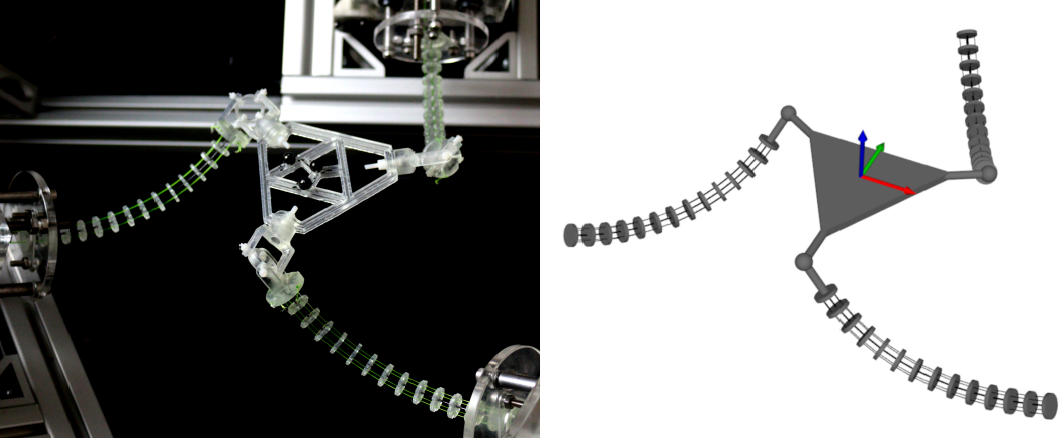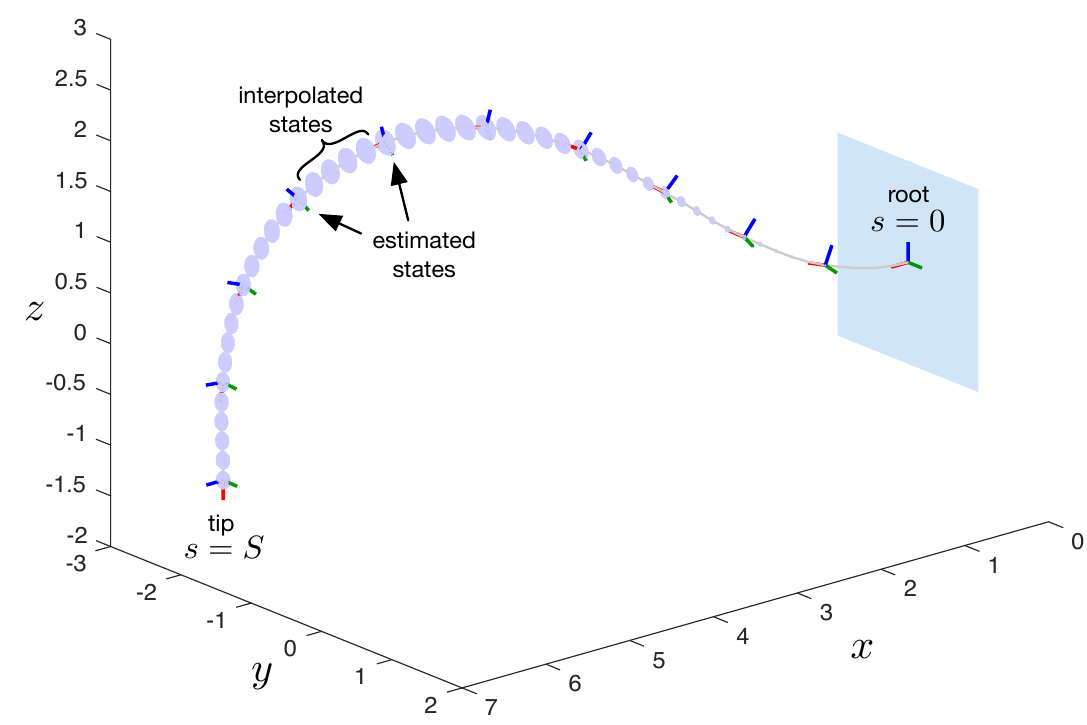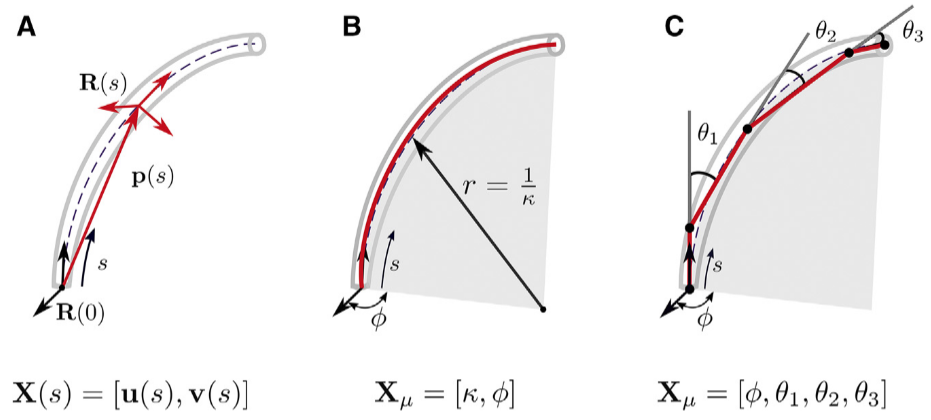I am currently a Postdoctoral Fellow working with Tim Barfoot at the Autonomous Space Robotics Laboratory at the University of Toronto Robotics Institute, Canada. I obtained my Ph.D. in Computer Science working at the Continuum Robotics Laboratory at the University of Toronto, Canada. Prior to this, I completed both a B.Sc. and an M.Sc. in Electrical Engineering and Information Technology at the Leibniz University Hannover, Germany.
My research is primarily concerned with continuum robots focusing on their design, modeling, control and kinematic evaluation. In my Ph.D. thesis, supervised by Jessica Burgner-Kahrs, I investigated parallel continuum robots - manipulators that consist of multiple individual robots that are physically coupled into a parallel structure and work together collaboratively.
Postdoctoral Fellow
Autonomous Space Robotics Laboratory
University of Toronto Robotics Institute
Toronto, Ontario, Canada
Selected Research Projects

Previously in collaboration with the Institute for Mechatronic Systems, Leibniz University Hannover, Germany.
Relevant Papers: #1, #2, #3, #4, #5, #6 / Seminar Talk

In collaboration with Tim Barfoot, Autonomous Space Robotics Lab, University of Toronto, Canada.
Relevant Paper: #1, #2, #3, #4 / Blogpost / Seminar Talk

In collaboration with Priyanka Rao, CRL, UofT, Canada, and Quentin Peyron, INRIA, University of Lille, France. Previously in collaboration with M. Taha Chikhaoui, TIMC Laboratory, Grenoble, France.
Relevant Papers: #1, #2 / Code

Partly in collaboration with Hanna Zhang, CRL, UofT, Canada, and M. Taha Chikhaoui, TIMC Laboratory, CNRS, Grenoble, France. Previously in collaboration with the International Neuroscience Institute, Hannover, Germany, and Fraunhover MEVIS, Bremen, Germany.
Relevant Papers: #1, #2, #3, #4
Publications
Journal Articles- Parallel-Continuum Robots: A Survey
Sven Lilge, Kathrin Nuelle, Jake A. Childs, Kefei Wen, D. Caleb Rucker, and Jessica Burgner-Kahrs
IEEE Transactions on Robotics, 2024 - Singularity Analysis of 3-DOF Planar Parallel Continuum Robots with Constant Curvature Links
Sven Lilge, Kefei Wen, and Jessica Burgner-Kahrs
Frontiers in Robotics and AI, 2023 - Kinetostatic Modeling of Tendon-Driven Parallel Continuum Robots
Sven Lilge and Jessica Burgner-Kahrs
IEEE Transactions on Robotics, 2022 - Continuum Robot State Estimation using Gaussian Process Regression on SE(3)
Sven Lilge, Timothy D. Barfoot, and Jessica Burgner-Kahrs
The International Journal of Robotics Research, 2022 - Tendon Actuated Continuous Structures in Planar Parallel Robots: A Kinematic Analysis
Sven Lilge, Kathrin Nuelle, Georg Boettcher, Svenja Spindeldreier, and Jessica Burgner-Kahrs
ASME Journal of Mechanisms and Robotics, 2021 - Design of a Reconfigurable Parallel Continuum Robot with Tendon-Actuated Kinematic Chains
Georg Boettcher, Sven Lilge, and Jessica Burgner-Kahrs
IEEE Robotics and Automation Letters, 2021 - How to Model Tendon-Driven Continuum Robots and Benchmark Modelling Performance
Priyanka Rao, Quentin Peyron, Sven Lilge, and Jessica Burgner-Kahrs
Frontiers in Robotics and AI, 2021 - Estimating Tip Contact Forces for Concentric Tube Continuum Robots based on Backbone Deflection
Heiko Donat, Sven Lilge, Jessica Burgner-Kahrs, and Jochen J. Steil
IEEE Transactions on Medical Robotics and Bionics, 2020 - Modeling, Calibration, and Evaluation of a Tendon-Actuated Planar Parallel Continuum Robot
Kathrin Nuelle, Tim Sterneck, Sven Lilge, Dezhu Xiong, Jessica Burgner-Kahrs, and Tobias Ortmaier
IEEE Robotics and Automation Letters, 2020 - Comparison of Modeling Approaches for a Tendon Actuated Continuum Robot with Three Extensible Segments
M. Taha Chikhaoui, Sven Lilge, Simon Kleinschmidt, and Jessica Burgner-Kahrs
IEEE Robotics and Automation Letters, 2019 - Auditory Display for Telerobotic Transnasal Surgery Using a Continuum Robot
David Black, Sven Lilge, Carolin Fellmann, Anke V. Reinschluessel, Lars Kreuer, Arya Nabavi, Horst K. Hahn, Ron Kikinis, and Jessica Burgner-Kahrs
Journal of Medical Robotics Research, 2019
- Space-Time Continuum: Continuous Shape and Time State Estimation for Flexible Robots
Spencer Teetaert, Sven Lilge, Jessica Burgner-Kahrs, and Timothy D. Barfoot
40th Anniversary of the IEEE International Conference on Robotics and Automation, 2024 - LaserSAM: Zero-Shot Change Detection Using Visual Segmentation of Spinning LiDAR
Alexander Krawciw, Sven Lilge, and Timothy D. Barfoot
21st Conference on Robots and Vision, 2024 - Cooperative Control of Dual-Arm Concentric Tube Continuum Robots
Hanna J. Zhang, Sven Lilge, M. Taha Chikhaoui, and Jessica Burgner-Kahrs
International Conference on Manipulation, Automation and Robotics at Small Scales, 2022 - Learning-Based Inverse Kinematics from Shape as Input for Concentric Tube Continuum Robots
Nan Liang, Reinhard M. Grassmann, Sven Lilge, and Jessica Burgner-Kahrs
IEEE International Conference on Robotics and Automation, 2019 - Comparison of Haptic and Auditory Feedback Methods for the Teleoperation of Concentric Tube Continuum Robots
Sven Lilge, David Black, Arya Nabavi, and Jessica Burgner-Kahrs
Proceedings of the 17th Annual Meeting of the German Society for Computer- and Robot-Assisted Surgery e.V., 2018 - Entwicklung von Kontrollalgorithmen für die Teleoperation von tubulären Kontinuumsrobotern
Lars Kreuer, Sven Lilge, and Jessica Burgner-Kahrs
Proceedings of the 16th Annual Meeting of the German Society for Computer- and Robot-Assisted Surgery e.V., 2017
- FoMo: A Proposal for a Multi-Season Dataset for Robot Navigation in Forêt Montmorency
Matěj Boxan, Alexander Krawciw, Effie Daum, Xinyuan Qiao, Sven Lilge, Timothy D. Barfoot, and François Pomerleau
Field Robotics Workshop at IEEE International Conference on Robotics and Automation, 2024 - Derivation and Evaluation of a Kinetostatic Modeling Approach for Spatial Tendon Driven Parallel Continuum Robots
Sven Lilge and Jessica Burgner-Kahrs
Parallel Robots or not Parallel Robots? New Frontiers of Parallel Robotics Workshop at IEEE International Conference on Robotics and Automation, 2022 - Design, Modeling and Evaluation of Tendon Driven Parallel Continuum Robots
Sven Lilge and Jessica Burgner-Kahrs
Parallel Robots or not Parallel Robots? New Frontiers of Parallel Robotics Workshop at IEEE International Conference on Robotics and Automation, 2021 - CTCR Prototype Development: An Obstacle in the Research Community?
Reinhard Grassmann, Sven Lilge, Phuong Le, and Jessica Burgner-Kahrs
Robotics Retrospective Workshop at Robotics: Science and Systems Conference, 2020 - Enforcing Shape Constraints during Motion of Concentric Tube Continuum Robots
Sven Lilge and Jessica Burgner-Kahrs
Open Challenges and State-of-the-Art in Control System Design and Technology Development for Surgical Robotic Systems Workshop at IEEE International Conference on Robotics and Automation, 2019 - Towards Learning Force Sensing for a Concentric Tube Continuum Robot
Heiko Donat, Sven Lilge, Jessica Burgner-Kahrs, and Jochen J. Steil
Open Challenges and State-of-the-Art in Control System Design and Technology Development for Surgical Robotic Systems Workshop at IEEE International Conference on Robotics and Automation, 2019
- State Estimation for Continuum Multi-Robot Systems on SE(3)
Sven Lilge, Timothy D. Barfoot, and Jessica Burgner-Kahrs
IEEE Transactions on Robotics, In Review - Incorporating Control Inputs in Continuous-Time Gaussian Process State Estimation for Robotics
Sven Lilge, and Timothy D. Barfoot
Robotica, In Review - A Non-Linear Model Predictive Task-Space Controller Satisfying Shape Constraints for Tendon-Driven Continuum Robots
Maximillian Hachen, Chengnan Shentu, Sven Lilge, and Jessica Burgner-Kahrs
IEEE Robotics Automation Letters, In Review - Radar Teach and Repeat: Architecture and Initial Field Testing
Xinyuan Qiao, Alexander Krawciw, Sven Lilge, and Timothy D. Barfoot
IEEE International Conference on Robotics and Automation, In Review
Teaching Experience
Fundamentals of Robotics, 2019-2022An introduction to robotics covering basic methodologies, tools, and concepts to build a foundation for advanced topics in robotics. The course covers robot manipulators; kinematics; motion planning; and control. Topics covered in lecture are implemented in a practical environment utilizing both Gazebo simulations and physical Franka Emika Panda robots.
My responsibilities as the head TA included creating course material and assignments, tutoring and supervising students in practical exercises as well as designing and delivering selected lectures.
UofT Course Code: CSC376H5F
Introduction to Continuum Robotics, 2021
An introduction to continuum robots. Topics include continuum robot design; mechanisms and actuation; kinematic modeling; motion planning and control; and sensing. Topics covered in the lecture are implementedin a practical environment using a custom simulation framework for continuum robots.
My responsibilities as the head TA included creating course material and assignments, tutoring and supervising students in practical exercises as well as designing and delivering selected lectures.
UofT Course Code: CSC476H5/CSC2606